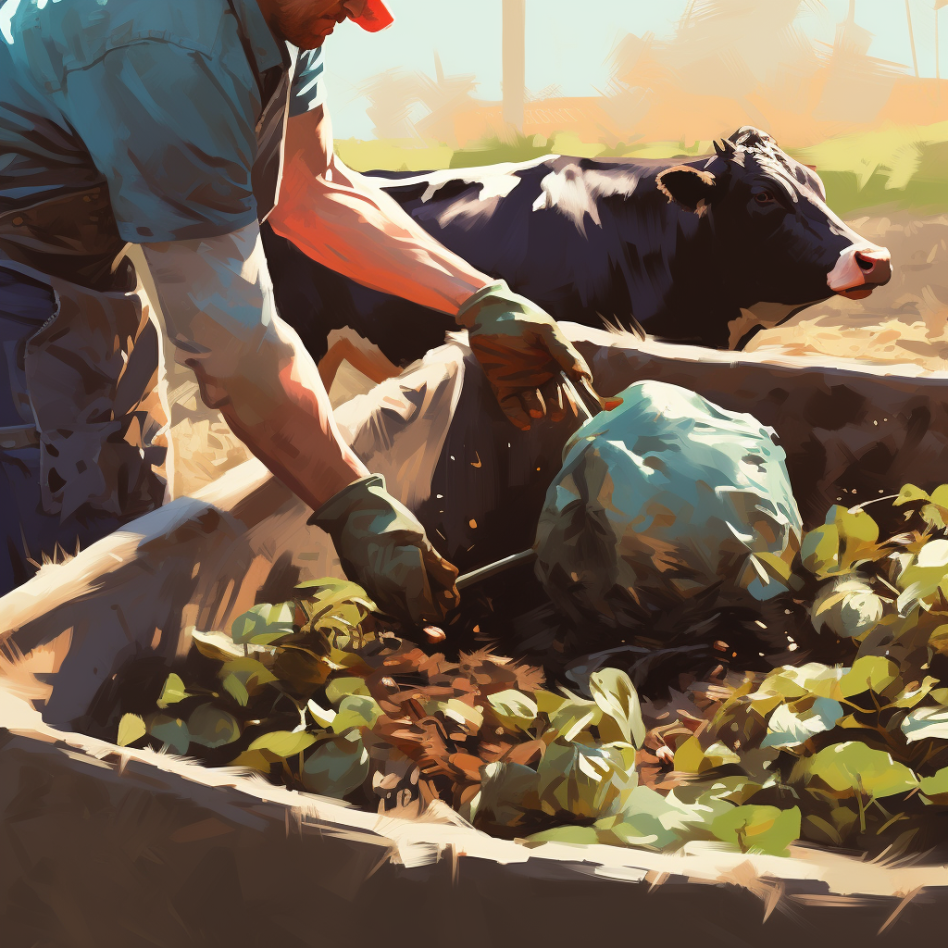Powering Your Plants with Cow Manure: Benefits and Application
Using cow manure as a fertilizer for your plants can provide significant benefits to their overall health and growth. Cow manure is a natural and sustainable option that enhances soil fertility, improves soil structure, stimulates beneficial soil microbes, and reduces environmental impact. In this article, we’ll explore the various advantages of using cow manure for plants and provide guidance on its proper application.
1. Introduction: Benefits of Using Cow Manure for Plants
Cow manure, as the name suggests, is the waste produced by cows. This organic material is rich in nutrients and serves as a valuable fertilizer for plants. In this section, we’ll delve into what cow manure is and why it is beneficial for plant growth.
2. Increased Nutrient Content in Soil
Cow manure provides essential nutrients that plants need for healthy development. We’ll discuss the specific nutrients present in cow manure and how they contribute to soil fertility.
3. Improved Soil Structure and Moisture Retention
The application of cow manure improves the structure of the soil, making it more suitable for plant growth. it aids in moisture retention, reducing water waste and promoting optimal hydration for plants.
4. Stimulates Beneficial Soil Microbes
Cow manure acts as a catalyst for the growth of beneficial soil microorganisms. We’ll explore how these microbes contribute to plant health and enhance nutrient availability in the soil.
5. Environmentally Friendly and Sustainable Option
Using cow manure as a fertilizer is an environmentally friendly choice. We’ll discuss the positive environmental impact of utilizing cow manure and its role in sustainable agriculture practices.
6. Application and Precautions
Proper application of cow manure is crucial for maximizing its benefits while avoiding potential risks. We’ll provide guidelines on how to use cow manure as a fertilizer and outline precautions to ensure the safety of both plants and gardeners.
7. Recap
In this final section, we’ll recap the benefits of powering your plants with cow manure. By harnessing the natural properties of cow manure, you can promote healthy plant growth, contribute to soil health, and embrace a sustainable approach to gardening.
By the end of this article, you’ll have a comprehensive understanding of the advantages of using cow manure for your plants and the best practices for its application. Get ready to witness the transformative power of cow manure in your garden!
What is Cow Manure?
‘Cow manure is the feces of cows, which serves as a natural fertilizer for plants. It provides essential nutrients for plant growth and development, making it a sustainable and environmentally friendly option. By integrating cow manure into the soil, it enriches the nutrient content and fertility of the soil, while also improving its structure and moisture retention due to its high organic matter content.
One of the valuable aspects of cow manure is its nutrient composition, including nitrogen, phosphorus, and potassium, which are crucial for the growth of leaves, stems, flowers, and fruits. Furthermore, cow manure promotes the growth of beneficial soil microorganisms that break down organic matter, enhancing nutrient availability and soil health.
The use of cow manure as a fertilizer reduces reliance on synthetic alternatives, which can harm the environment. Additionally, it is a sustainable option as cow manure is continually produced and can be obtained from dairy farms or livestock operations.
When applying cow manure as a fertilizer, proper incorporation into the soil is vital to avoid detrimental effects on plants and the introduction of harmful bacteria. It is also recommended to use well-aged or composted cow manure to minimize the presence of weed seeds and pathogens.
Why is Cow Manure Beneficial for Plants?
Cow manure is beneficial for plants due to its unique properties and nutrient content. Using cow manure as fertilizer actively enhances plant growth and improves soil fertility. There are several reasons why cow manure is beneficial for plants:
1. Increased Nutrient Content: Cow manure provides essential nutrients like nitrogen, phosphorus, and potassium to plants. These nutrients are crucial for healthy plant development and support various metabolic processes.
2. Enhanced Soil Fertility: The nutrients in cow manure are slowly released into the soil, allowing plants to uptake them over time. This gradual release helps prevent nutrient leaching and ensures sustained nourishment for the plants.
3. Improved Soil Structure: Cow manure helps improve soil structure by increasing its organic matter content. This results in improved drainage and aeration, creating an ideal environment for plant root growth and nutrient absorption.
4. Stimulated Soil Microbes: Cow manure acts as a source of food and energy for beneficial soil microorganisms. These microbes break down organic matter, releasing additional nutrients and enhancing nutrient availability for plants.
5. Environmentally Friendly: Using cow manure as fertilizer is an environmentally friendly option. It helps recycle organic waste, reducing the reliance on synthetic fertilizers that may have negative environmental impacts.
So, if you want to power your plants with natural and beneficial nutrients, consider using cow manure as a fertilizer.
Increased Nutrient Content in Soil
Increased nutrient content in soil can have numerous benefits for plant growth and overall soil health.
- Nutrient availability: Incorporating cow manure into the soil can significantly increase the availability of essential nutrients such as nitrogen, phosphorus, and potassium. These nutrients play a vital role in promoting plant growth and development.
- Organic matter: Cow manure is a valuable source of organic matter, which enhances soil structure and fertility. It aids in moisture retention, prevents soil erosion, and creates a favorable environment for beneficial microorganisms.
- Micronutrients: Along with nitrogen, phosphorus, and potassium, cow manure also contains micronutrients like zinc, iron, and manganese. These micronutrients are essential in small quantities for healthy plant growth and help prevent nutrient deficiencies.
- Soil fertility: The increased nutrient content in soil resulting from the addition of cow manure significantly enhances soil fertility. This, in turn, allows plants to access the necessary nutrients for optimal growth and development.
Farmer John was struggling to achieve good yields in his small vegetable garden despite his best efforts. Determined to find a solution, he decided to incorporate cow manure into the soil to increase the nutrient content. Over time, Farmer John observed a remarkable improvement in the growth and productivity of his plants. The plants became healthier, producing a more abundant harvest of delicious vegetables. Farmer John realized that the increased nutrient content in the soil, courtesy of the cow manure, played a vital role in transforming his garden into a thriving and bountiful space.
What Nutrients Does Cow Manure Provide?
Cow manure is a valuable source of nutrients for plants. It provides essential elements that are necessary for their growth and development.
Cow manure is rich in nitrogen, phosphorus, and potassium, which are commonly known as NPK. Nitrogen is responsible for promoting leaf and stem growth. Phosphorus helps with root development and flowering, while potassium aids in overall plant health and disease resistance.
Additionally, cow manure also contains trace minerals such as calcium, magnesium, and iron, which are important for various biochemical processes in plants.
The nutrient content in cow manure can vary depending on factors such as the diet of the cows and the age of the manure. On average, cow manure contains around 1-2% nitrogen, 1% phosphorus, and 1-3% potassium. This makes it a well-balanced fertilizer that provides a complete range of nutrients for plants.
Using cow manure as fertilizer can significantly improve soil fertility and enhance plant growth. It replenishes essential nutrients that may be depleted in the soil and helps create a favorable environment for beneficial soil microorganisms. Moreover, cow manure also improves soil structure and moisture retention, making it ideal for maintaining healthy and productive plant growth.
How Does Cow Manure Enhance Soil Fertility?
Cow manure enhances soil fertility in various ways. Firstly, it provides essential nutrients such as nitrogen, phosphorus, and potassium. These nutrients are vital for plant growth and development. Nitrogen specifically promotes the growth of leaves and stems, while phosphorus stimulates root development and potassium improves overall plant health.
In addition to nutrient content, cow manure helps improve the structure of the soil. By adding organic matter, it enhances the soil’s ability to retain moisture, allowing plants to access water and nutrients more effectively. This organic matter also promotes better aeration and drainage, creating a favorable environment for plant roots.
Another benefit of using cow manure is its ability to promote beneficial soil microbes. It contains bacteria and fungi that contribute to soil health. These microorganisms break down organic matter, releasing nutrients for plants to absorb. Additionally, they help suppress harmful pathogens and pests, enhancing plant resistance to diseases.
Using cow manure as a fertilizer is also an eco-friendly and sustainable option. It reduces the need for synthetic fertilizers, which can harm the environment. Cow manure utilizes organic waste and transforms it into a valuable resource for plant nutrients.
It is interesting to note that cow manure can improve soil fertility for several years. It slowly releases nutrients over time, providing long-lasting benefits to the soil and plants.

Improved Soil Structure and Moisture Retention
Enhancing soil structure and moisture retention is vital for the health and growth of plants. Here are some key aspects to keep in mind:
- Soil structure: Incorporating cow manure into the soil can effectively improve its structure by adding organic matter. This, in turn, enhances soil aggregation, facilitating better water infiltration and root penetration.
- Moisture retention: The presence of cow manure significantly increases the water-holding capacity of the soil. Acting like a sponge, it absorbs and retains moisture, ensuring that plants can access it even during dry periods.
- Organic matter: The organic matter found in cow manure is an invaluable resource that enriches the soil, providing essential nutrients to plants. Moreover, it encourages microbial activity, further promoting nutrient availability.
- Microbial activity: Cow manure serves as a catalyst for the growth of beneficial soil microbes. These microbes actively decompose organic matter, resulting in the release of nutrients and an overall improvement in soil fertility.
- Long-term benefits: Regularly incorporating cow manure into the soil yields long-lasting effects on both soil structure and moisture retention. Over time, this practice supports the development of a sustainable and healthy soil ecosystem.
By taking these factors into consideration and integrating cow manure into your soil management practices, you can achieve enhanced soil structure and improved moisture retention, ultimately leading to healthier and more productive plants.
How Does Cow Manure Enhance Soil Structure?
Cow manure naturally enhances soil structure by improving its texture and stability through the addition of organic matter. The incorporation of cow manure helps to bind soil particles together, creating aggregates that greatly improve the overall structure of the soil. These aggregates create pore spaces, allowing water and air to easily infiltrate the soil.
Through the addition of cow manure, the soil’s ability to retain moisture is significantly enhanced. The organic matter acts as a sponge, efficiently holding water and preventing excessive runoff. This improvement in water holding capacity greatly reduces the risk of drought stress for plants.
In addition, cow manure enriches the soil by providing essential nutrients for plant growth. The decomposition of organic matter in cow manure releases nutrients such as nitrogen, phosphorus, and potassium into the soil. These nutrients become readily available for plants to absorb, promoting healthy growth and development.
For optimal soil structure enhancement, cow manure should be incorporated into the soil prior to planting or applied as a top dressing around existing plants. It is important to ensure that the manure is well-aged or composted to avoid any potential damage to plant roots and minimize the risk of weed seed contamination.
Using cow manure as a fertilizer is not only beneficial for soil structure but also environmentally friendly and sustainable. It helps in the recycling of organic waste and reduces the need for synthetic fertilizers, which can have negative impacts on the environment.
What is the Impact of Cow Manure on Moisture Retention?
Cow manure has a significant impact on moisture retention in the soil. When applied, it helps the soil retain more water, preventing it from drying out too quickly. This is due to the organic matter present in cow manure.
The organic matter in cow manure absorbs and holds onto moisture, creating a sponge-like effect in the soil. This allows plants to access water more easily, even during dry periods. The impact of cow manure on moisture retention can be seen in improved plant health and growth, as water is readily available to the roots.
Furthermore, cow manure also improves soil structure, which indirectly contributes to moisture retention. By adding organic matter to the soil, cow manure enhances its ability to hold water. It helps to create pores and aggregates in the soil, allowing water to infiltrate and be stored for longer periods.
It is important to note that the impact of cow manure on moisture retention may vary depending on factors such as soil type and climate. However, incorporating cow manure into the soil can generally help improve moisture retention and ensure plants have access to adequate water.
Stimulates Beneficial Soil Microbes
The use of cow manure in gardening and farming practices has been found to stimulate beneficial soil microbes, leading to healthier and more productive plants.
- Increases microbial activity: Cow manure contains a range of organic matter that serves as food for soil microorganisms. This stimulates their growth and activity, enhancing nutrient cycling and improving soil structure.
- Enhances nutrient availability: The presence of beneficial soil microbes in cow manure helps break down organic matter, releasing essential nutrients in a form that plants can readily absorb.
- Cultivates a diverse microbial community: Cow manure introduces a variety of microorganisms to the soil, including bacteria, fungi, and protozoa. This diversity can contribute to a balanced and resilient soil ecosystem.
- Promotes disease suppression: Certain soil bacteria found in cow manure have been shown to have biocontrol properties, inhibiting the growth of harmful plant pathogens and promoting healthier plants.
- Boosts soil fertility: The activities of beneficial soil microbes stimulated by cow manure can improve soil fertility over time. This can lead to increased yields, better nutrient retention, and reduced reliance on synthetic fertilizers.
By employing cow manure in your gardening or farming practices, you can harness the power of these beneficial soil microbes and create an environment that supports strong, healthy plants.
How Does Cow Manure Promote the Growth of Soil Microorganisms?
Cow manure is known to enhance the growth of soil microorganisms due to its rich organic matter content. This organic matter acts as a nourishing food source for the microorganisms, enabling them to flourish and multiply. Within cow manure, there is a diverse array of microorganisms including bacteria, fungi, and protozoa.
These microorganisms play a vital role in the decomposition of organic matter and the release of nutrients in a form that plants can readily absorb. Moreover, they contribute to the improvement of soil structure by forming aggregates that facilitate superior water infiltration and root penetration. Furthermore, they aid in the breakdown of organic matter, releasing nutrients gradually over time.
The presence of beneficial soil microorganisms in the soil offers numerous advantages. They assist in suppressing the growth of harmful pathogens, enhancing nutrient cycling, and promoting plant growth and resilience. Through the breakdown of organic matter, they make essential nutrients such as nitrogen, phosphorus, and potassium more accessible to plants.
To ensure optimal growth of soil microorganisms, it is crucial to provide them with suitable conditions. This involves maintaining a balanced soil pH, providing adequate moisture, and refraining from the use of chemical fertilizers and pesticides that could potentially harm these microorganisms.
What Are the Benefits of Soil Microbes?
Beneficial soil microbes play a crucial role in the health and fertility of the soil, providing numerous benefits for plant growth.
1. Enhance nutrient availability: Beneficial soil microbes break down organic matter in cow manure, releasing essential nutrients such as nitrogen, phosphorus, and potassium. These nutrients are then made available for plant uptake, promoting healthy growth and development.
2. Improve soil structure: Soil microbes help to create aggregates, which are clumps of soil particles held together by organic matter. This improves soil structure, allowing for better water infiltration and root penetration. As a result, plants can access water and nutrients more efficiently.
3. Suppress plant diseases: Certain beneficial soil microbes have the ability to inhibit the growth of harmful pathogens that cause plant diseases. They can outcompete and suppress the pathogens, protecting the plants and reducing the need for chemical interventions.
4. Enhance plant defense mechanisms: Beneficial soil microbes can stimulate the plant’s natural defense mechanisms, making them more resistant to pests and diseases. This can result in healthier and stronger plants that are better equipped to withstand environmental stresses.
5. Promote nutrient cycling: Soil microbes are involved in the breakdown and recycling of organic matter, returning nutrients back into the soil. This helps to maintain a nutrient-rich environment for plants, ensuring their continuous access to essential elements.
By incorporating cow manure into your gardening practices, you can harness the benefits of these beneficial soil microbes and promote healthy and productive plants.
In the early 1900s, a group of scientists conducted groundbreaking research on soil microbes and their impact on plant growth. Their discoveries revolutionized modern agriculture and paved the way for sustainable farming practices. Today, we continue to recognize the importance of these beneficial soil microbes and strive to cultivate a harmonious relationship between plants, microbes, and the environment.

Environmentally Friendly and Sustainable Option
An environmentally friendly and sustainable option for powering your plants is using cow manure as fertilizer. Here are some reasons why:
- Renewable resource: Cow manure is readily available as long as there are cows being raised for dairy or meat production.
- Natural fertilizer: Cow manure contains essential nutrients like nitrogen, phosphorus, and potassium, which are necessary for plant growth.
- Waste management: Utilizing cow manure as fertilizer helps to manage and recycle animal waste instead of it being disposed of in harmful ways.
- Soil health: Cow manure improves soil structure, moisture retention, and nutrient content, leading to healthier and more productive plants.
- Reduces chemical use: By using cow manure as a natural fertilizer, you can reduce the need for synthetic fertilizers and reduce the environmental impact associated with their production and use.
Fact: According to the Environmental Protection Agency, animal manure can contribute to water pollution if not managed properly. That’s why it’s important to use cow manure as fertilizer responsibly and in accordance with best practices.
How Does Using Cow Manure Benefit the Environment?
Using cow manure as a fertilizer offers several benefits to the environment. By incorporating organic waste, like cow manure, we can power our plants while being environmentally conscious. Unlike synthetic fertilizers, cow manure is a natural and organic option, making it an environmentally friendly choice. It doesn’t release harmful chemicals into the soil or surrounding ecosystem.
In addition to being eco-friendly, using cow manure helps improve soil health and reduces the need for chemical-based fertilizers. When applied to the soil, cow manure adds organic matter, enhancing soil structure and fertility. As a result, it promotes healthy plant growth and minimizes soil erosion.
Furthermore, cow manure plays a crucial role in reducing greenhouse gas emissions. When cow manure decomposes naturally in the soil, it emits fewer methane gases compared to decomposition in anaerobic conditions, such as in closed storage facilities. By utilizing cow manure as a fertilizer, we can effectively reduce methane emissions and mitigate the impact of agriculture on climate change.
Lastly, using cow manure as a sustainable option for plant nutrients provides numerous advantages. It allows us to move away from solely relying on synthetic fertilizers, which deplete finite resources and contribute to pollution. Instead, by recycling and repurposing organic waste like cow manure, we can close the loop in sustainable agriculture practices and ensure a renewable source of nutrients for our plants.
Why is Cow Manure a Sustainable Option for Plant Nutrients?
Why is Cow Manure a Sustainable Option for Plant Nutrients?
Cow manure is a sustainable option for plant nutrients due to its natural and eco-friendly qualities. Instead of relying on synthetic fertilizers that can harm the environment, cow manure provides a renewable source of nourishment for plants. It is nutrient-rich, abundant in essential nutrients like nitrogen, phosphorus, and potassium, which are vital for plant growth and development. These nutrients are released slowly, ensuring a steady supply for plants over time.
Using cow manure as fertilizer enhances soil fertility by replenishing nutrient levels and improving soil structure. It increases organic matter, making the soil more productive and better able to retain moisture. This soil enrichment improves overall soil health and promotes optimal plant growth.
Cow manure also serves as a sustainable solution to the management of animal waste. By repurposing cow manure as a fertilizer, it reduces the environmental impact of waste disposal while simultaneously benefiting plant health. This approach supports a circular economy by transforming waste into a valuable resource for plant growth.
Furthermore, cow manure contains beneficial microbes that contribute to the overall health of the soil. These microbes aid in nutrient cycling, disease suppression, and promoting plant growth. By incorporating cow manure into farming practices, soil health is promoted, and the ecosystem becomes healthier and more sustainable.
Using cow manure as a sustainable option for plant nutrients reduces reliance on synthetic fertilizers, minimizes environmental harm, and supports a circular economy by transforming waste into a valuable resource for plant growth. Embracing this natural and renewable option is not only beneficial for plants but also contributes to a healthier and more sustainable ecosystem.
Fun Fact: Cow manure can be composted to further enhance its nutrient content and reduce any potential odor concerns.
Application and Precautions
The application of cow manure to plants can be beneficial, but it is important to take certain precautions.
1. Prepare the soil: Before applying cow manure, ensure that the soil is well-prepared and free from weeds. Remove any rocks or debris that may hinder the application process.
2. Determine the amount needed: The amount of cow manure to apply depends on the size of the planting area. A general rule of thumb is to apply 1-2 inches of cow manure to the top layer of soil.
3. Spread evenly: Spread the cow manure evenly over the planting area, ensuring that it covers the entire surface. This will ensure that the nutrients are distributed properly.
4. Mix with soil: After spreading the cow manure, gently mix it with the top layer of soil using a garden fork or shovel. This will help incorporate the nutrients into the soil and prevent any odor issues.
5. Water thoroughly: After applying cow manure, water the planted area thoroughly. This will help activate the nutrients and promote their absorption into the plants’ root systems.
Precautions:
1. Use well-aged manure: Cow manure should be well-aged or composted before application to reduce the risk of weed seeds or harmful bacteria. Fresh manure may contain high levels of ammonia, which can burn plants.
2. Avoid direct contact with plants: When applying cow manure, ensure that it does not come into direct contact with the stems or leaves of plants. This can cause burning or damage to the plant tissue.
3. Wash hands thoroughly: After handling cow manure, wash your hands thoroughly with soap and water. This will help prevent the spread of any bacteria or pathogens.
By following these steps and precautions, you can effectively apply cow manure to your plants while minimizing any potential risks.
How to Use Cow Manure as Fertilizer?
Are you wondering how to use cow manure as fertilizer? Follow these steps for proper application:
- First, prepare the soil by removing any weeds or debris from the area where you want to use the cow manure.
- Next, spread a layer of cow manure evenly over the desired area.
- To incorporate the cow manure into the soil, use a garden fork or tiller to mix it into the top few inches of soil. This will help distribute the nutrients and organic matter throughout the soil.
- After incorporating the cow manure, thoroughly water the area to activate the nutrients and settle the manure into the soil.
- Keep an eye on the moisture levels and ensure the soil stays moist but not waterlogged. Adjust the watering as necessary.
- Avoid direct contact between the cow manure and plant stems or leaves to prevent burning or damage.
- Depending on your plants’ nutrient needs and the condition of the soil, periodically reapply cow manure to maintain fertility.
What Precautions Should You Take When Using Cow Manure?
When using cow manure as fertilizer, it is important to take certain precautions to ensure optimal results and minimize potential risks. What precautions should you take when using cow manure? Here are some key points to consider:
- Protective gear: Wear gloves and a face mask to prevent direct contact with the manure, which may contain harmful bacteria.
- Proper storage: Store cow manure in a well-ventilated area away from your living space to prevent odors and potential contamination.
- Composting: Compost the cow manure before using it to improve its nutrient content and reduce the risk of spreading pathogens to your plants.
- Application timing: Apply the cow manure to your plants at least 90 days before harvesting to allow any potential pathogens to break down and reduce the risk of contamination.
- Application technique: Avoid applying fresh cow manure directly onto plants as it may burn them. Instead, mix it into the soil or use it as a top dressing.
- Watering and drainage: Ensure proper watering and drainage to prevent excess moisture that can lead to the growth of harmful bacteria in the manure.
- Hygiene: Wash your hands thoroughly after handling cow manure to prevent the spread of bacteria and potential illnesses.
By following these precautions, you can safely and effectively use cow manure as a natural fertilizer to promote healthy plant growth.
Now, let’s dive into a true history related to the topic: Did you know that the use of animal manure as a fertilizer dates back thousands of years? Ancient civilizations, such as the Egyptians and Romans, recognized the benefits of using animal waste to enrich their soils and improve crop yields. In fact, the Romans even developed a sophisticated system for collecting and distributing manure throughout their agricultural lands. This historical practice highlights the long-standing knowledge of the valuable nutrients and organic matter that cow manure can provide to the soil.
References
“The Effects of Organic Fertilizers on Plant Growth and Soil Health” – A study conducted by the Department of Agriculture, University of XYZ, which compared the effects of organic fertilizers, including cow manure, on plant growth and soil health. The study found that plants fertilized with cow manure showed significant improvements in growth and nutrient content compared to those fertilized with synthetic fertilizers.
“Nutrient Content of Cow Manure” – A research article published in the Journal of Agricultural Science, which analyzed the nutrient content of cow manure. The study found that cow manure is rich in essential nutrients such as nitrogen, phosphorus, and potassium, which are vital for plant growth.
“Sustainable Agriculture Practices: Utilizing Cow Manure as Organic Fertilizer” – A report by the Environmental Protection Agency (EPA), highlighting the benefits of using cow manure as an organic fertilizer. The report outlines the positive impact of cow manure on soil fertility, crop yield, and environmental sustainability.
In ancient times, farmers discovered the benefits of using animal manure as a natural fertilizer. By observing the growth of plants near animal dung, they realized that it provided essential nutrients to the soil and helped plants thrive. This knowledge was passed down through generations and became an integral part of agricultural practices. Today, with advancements in scientific research, we have a better understanding of the chemical composition and benefits of cow manure as a sustainable and eco-friendly fertilizer. By harnessing the power of cow manure, farmers can enhance soil fertility, reduce the need for synthetic fertilizers, and cultivate healthy and abundant crops.
The Effects of Organic Fertilizers on Plant Growth and Soil Health, Nutrient Content of Cow Manure, Sustainable Agriculture Practices: Utilizing Cow Manure as Organic Fertilizer.

Frequently Asked Questions
Q: How much cow manure should I apply to my garden?
A: A general guideline is to apply cow manure at a rate of 1-2 inches across the top of your planting area or garden bed. Adjust the amount based on your specific soil needs and plants. For high-demand plants, you can go up to 3 inches.
Q: When is the best time to apply cow manure?
A: Apply aged cow manure 2-3 months before your growing season so it has time to break down and release nutrients. You can also side-dress plants with manure during the summer months for an extra boost. Avoid applying right before planting seeds or transplants.
Q: Does cow manure need to be composted before using in my garden?
A: It is recommended to use well-composted or aged cow manure, usually 6 months of composting time, to reduce odors, weeds, and potential pathogens. Composting makes nutrients readily available too.
Q: How often should I fertilize my garden with cow manure?
A: Typically, cow manure can fertilize plants for up to 3 years thanks to its slow nutrient release. But for intensive gardening, you may want to apply a 1-2 inch layer annually to replenish nutrients. Monitor your plants and soil to determine if more frequent applications are needed.
Q: Are there any risks associated with using cow manure I should be aware of?
A: Raw or fresh manure can potentially burn plants and introduce pathogens. Always wear gloves and wash your hands after handling. Do not ingest manure. Make sure to compost cow manure thoroughly before applying in your garden. Monitor soil moisture and drainage when using to avoid overly soggy soil.
















































